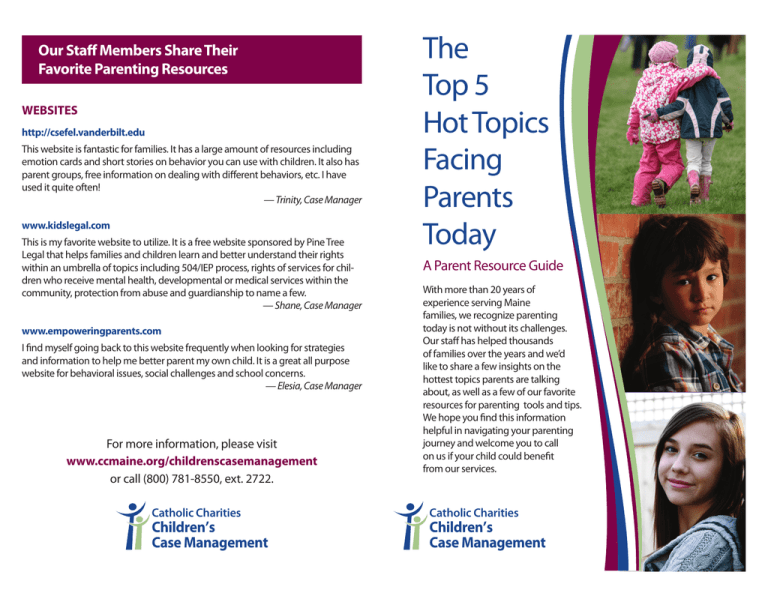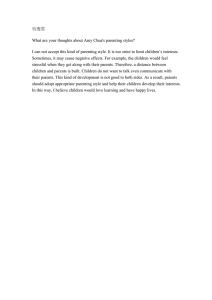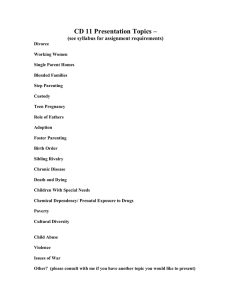The Top 5 Hot Topics Facing Parents Today
advertisement

Our Staff Members Share Their Favorite Parenting Resources WEBSITES http://csefel.vanderbilt.edu This website is fantastic for families. It has a large amount of resources including emotion cards and short stories on behavior you can use with children. It also has parent groups, free information on dealing with different behaviors, etc. I have used it quite often! — Trinity, Case Manager www.kidslegal.com This is my favorite website to utilize. It is a free website sponsored by Pine Tree Legal that helps families and children learn and better understand their rights within an umbrella of topics including 504/IEP process, rights of services for children who receive mental health, developmental or medical services within the community, protection from abuse and guardianship to name a few. — Shane, Case Manager www.empoweringparents.com I find myself going back to this website frequently when looking for strategies and information to help me better parent my own child. It is a great all purpose website for behavioral issues, social challenges and school concerns. — Elesia, Case Manager For more information, please visit www.ccmaine.org/childrenscasemanagement or call (800) 781-8550, ext. 2722. Catholic Charities Children’s Case Management The Top 5 Hot Topics Facing Parents Today A Parent Resource Guide With more than 20 years of experience serving Maine families, we recognize parenting today is not without its challenges. Our staff has helped thousands of families over the years and we’d like to share a few insights on the hottest topics parents are talking about, as well as a few of our favorite resources for parenting tools and tips. We hope you find this information helpful in navigating your parenting journey and welcome you to call on us if your child could benefit from our services. Catholic Charities Children’s Case Management 1. Bullying The sad truth is, bullying happens. If your child tells you they’re being bullied, let them know they’ve made the right choice by telling you. Validate their feelings and let them know its normal to feel hurt, sad and confused. Ask your child if they’ve told anyone else, such as a teacher, and be sure to make the school your ally in planning ways to prevent future bullying. Just because bullying happens, doesn’t mean you have to let it happen to your child. 2. Behavior Problems Too often, when a child begins to exhibit emotional or behavioral problems, parents find it hard to speak up. If you suspect your child has a mental illness, such as depression or anxiety, don’t be afraid to ask for a second opinion. Talk to your child’s doctor and teachers to see if they have noticed any of the behaviors that concern you or if they’ve seen any difference in your child. There are many services available to you and your child. 3. Social Behaviors As a parent, you know how to nurture your child’s body, but it’s just as important to nurture their social relationships. Children develop their sense of self from the relationships they form with others. The also learn how to give and take and how to handle the emotions and expectations of others, skills that are vital in helping them grow emotionally and socially. So be sure to encourage your child’s friendships, and watch them blossom! 4. Friendships Do you know your child’s friends? If you haven’t done so yet, express an interest in them — let your child know you feel friendships are important and worth the effort. And respect your child’s social style — some need a lot of friends, some want a few close friends, others make friends quickly, while some need time to warm up. Be supportive and flexible and help your child make time in life for friends — it’s a gift that will reward the both of you for a lifetime! 5. Stress It’s no surprise kids are stressed out — too often parents forget to monitor their own stress levels, and the best predictor of a child’s coping ability is how their parents cope. You can help by keeping the lines of communication open — a good relationship with you will help your child feel better and more relaxed. And don’t forget — no matter how busy your schedule and theirs, take time out to play and de-stress: it’s good for you and your child! Our Staff Members Share Their Favorite Parenting Resources BOOKS The Happiest Baby on the Block by Harvey Karp got me through the infant stages with sanity intact, and 1-2-3 Magic by Dr. Thomas Phelan has been a godsend ever since. They’re my parenting “must have” books! — Cheryl, Case Manager I have always liked the books Don’t Sweat the Small Stuff and Who Moved My Cheese? They both illustrate how much time and emotional energy gets directed about things we have no control over or things that in hindsight might not have been as important as we thought. It is about establishing perspective, and focusing our time and emotional energy on things that are more important or things we have control over. — Ken, Clinical Supervisor Two of the books I recommend to parents most often are The Out-of-Sync Child and The-Out-of Sync Child Has Fun, both by Carol Kranowitz. In my experience working in special education and case management, many children with behavioral and developmental issues often experience sensory dysregulation in varying degrees. These books help parents identify possible sensory issues that may be triggering behaviors or inhibiting community integration. They also help parents understand how their child may be feeling and offer fun and effective strategies, activities and games to cope with these issues. — Erin, Case Manager Ross Greene’s Lost at School is a great book! It gives step-by-step advice on how parents can better communicate with school personnel and help address the behavioral and emotional struggles that a child is going through. It provides real life examples and is an evidenced-based philosophy that all kids want to do well, but may be lacking a critical skill. The book will walk you through the different skills that behaviorally challenged children maybe lacking and how to teach them those skills that are needed to be successful at school. — Ricia, Referral & Intake Coordinator


